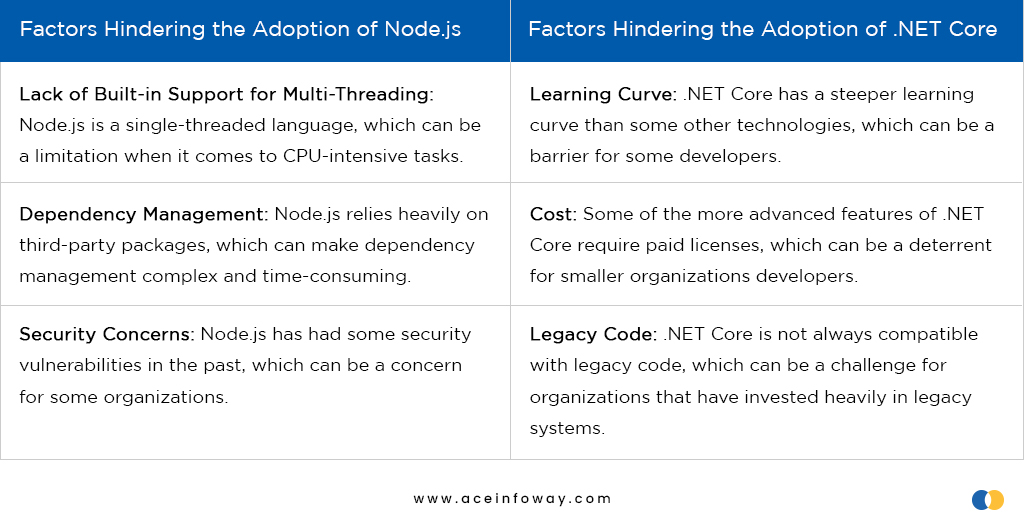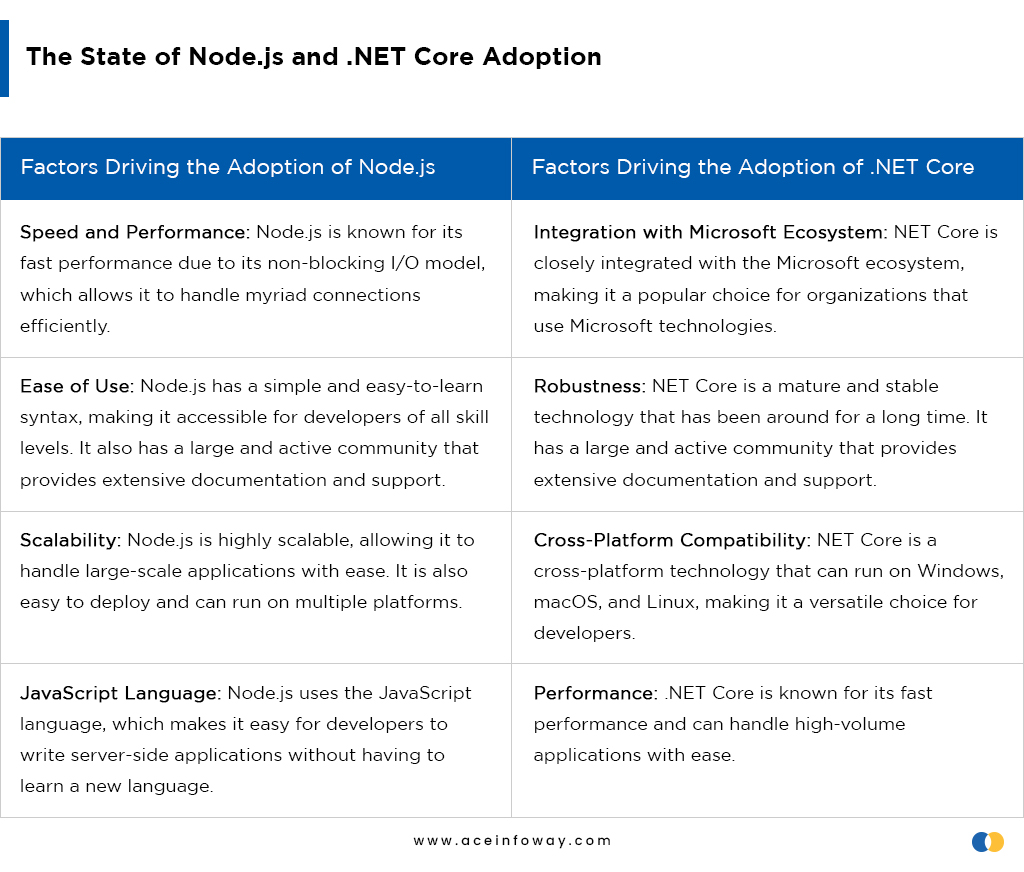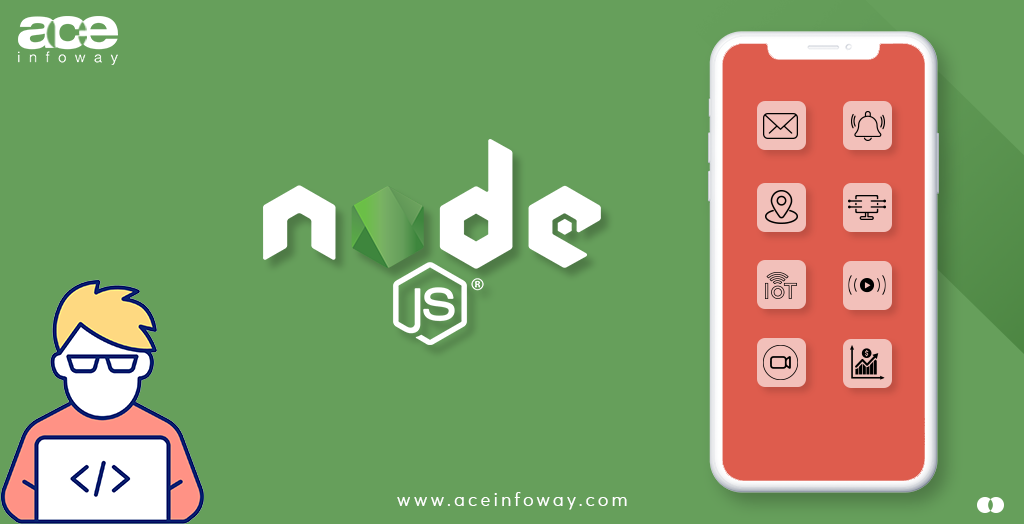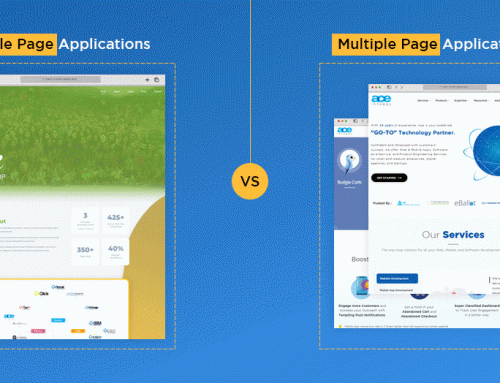Table of Contents
Node.js and .NET Core are two powerful platforms that have become staples in the world of web development. While both have their unique strengths and use cases, some have been asking whether Node.js is being replaced by .NET Core. Let us take a closer look at the strengths of each platform and examine the scenarios where they excel.
Node.js & .NET Core – Front Matter
While both Node.js and .NET Core, have their unique strengths and use cases, some have been asking whether Node.js is being replaced by .NET Core. Let’s talk in depth about this big question on everybody’s mind.
Node.js has been around since 2009 and has gained a massive following due to its speed, scalability, and ease of use. Its event-driven, non-blocking industrial organization model makes it ideal for real-time applications such as chat apps, gaming platforms, and streaming services. Moreover, Node.js boasts a vast library of modules and packages that can be leveraged to develop complex applications quickly. As a result, Node.js has become a go-to platform for startups and small businesses looking to build scalable applications quickly.

Node.js Performance Checklist
Get your free copy
On the other hand, .NET Core is a more recent addition to the world of web development. It is an open-source, cross-platform platform that is designed for building large-scale enterprise-level applications. Its seamless integration with the Microsoft ecosystem makes it a popular choice for companies that already use Microsoft products. Furthermore, .NET Core offers high-level security features and excellent performance, making it ideal for mission-critical applications.
With the right expertise and approach, developers can use either technology to build high-quality, reliable applications that meet their business needs. Let’s take a closer look at the strengths of each technology and the situations where they are most suitable.
Node.js vs .NET Core: A Comprehensive Comparison

While they share some similarities, let us compare Node.js and .NET Core in terms of performance, scalability, ease of use, community support, and other key factors.
Performance
When it comes to performance, Node.js has a clear advantage over .NET Core. Node.js uses an event-driven, non-blocking I/O model, which allows it to handle numerous concurrent connections without consuming a lot of system resources. This makes it ideal for building real-time applications, such as chat applications and online games. In contrast, .NET Core uses a thread-based approach, which can consume a lot of system resources and limit scalability in certain situations.
Scalability
Both Node.js and .NET Core are scalable technologies, but they use different approaches. Node.js uses a horizontal scaling approach, where multiple instances of the application are created and distributed across multiple servers to handle increasing traffic. This allows for near-infinite scalability, as long as there are enough resources available. .NET Core, on the other hand, uses a vertical scaling approach, where the application is run on a single server with more powerful hardware. While this approach can also provide high scalability, it may be more expensive and less flexible than horizontal scaling.
Ease of use
Node.js is known for its ease of use, as it allows developers to build applications using JavaScript, a language that is widely used in the development community. This means that developers who are already familiar with JavaScript can quickly learn Node.js and start building applications. In contrast, .NET Core requires developers to use C# or F#, two languages that may be less familiar to some developers. However, .NET Core does provide a more structured and organized development environment, which can be beneficial for larger development teams.
Community support
Both Node.js and .NET Core have large and active communities, which provide support, resources, and tools for developers. Node.js has a particularly strong community, with over 2 million packages available through the Node Package Manager (NPM). This makes it easy for developers to find and use existing code and libraries, which can speed up development time. .NET Core also has a strong community, with many resources available through the .NET Foundation and the Microsoft Developer Network (MSDN).
Real-world examples
To illustrate the differences between Node.js and .NET Core, let’s look at some real-world examples. Netflix, for example, uses Node.js for its real-time applications, such as its video player and chat feature. This allows them to handle large amounts of traffic and provide a seamless user experience. On the other hand, Microsoft uses .NET Core for its enterprise-level applications, such as its Azure cloud platform and Visual Studio development environment. .NET Core provides the structure and support needed for these complex applications.
The State of Node.js and .NET Core Adoption
According to the Stack Overflow Developer Survey 2022, Node.js is the most commonly used framework, library, or tool for web development, with over 47% of developers using it.
One of the key factors contributing to the popularity of Node.js is its ability to handle many coexisting requests with high performance. This makes it an ideal choice for building real-time applications, such as chat applications and online gaming platforms.
Additionally, Node.js has a vast and active community, which has contributed to the development of numerous third-party packages and libraries, making it easy for developers to create complex applications quickly.

Moreover, Node.js has been adopted by several large companies, including Netflix, LinkedIn, and Walmart, who have built their applications using this technology. These companies have reported significant improvements in their application performance and have highlighted the benefits of using Node.js for building scalable and high-performing applications.
NET Core is a free and open-source, cross-platform framework that is quickly gaining popularity among developers worldwide. Since its initial release in 2016, it has grown to become a major player in the market, competing against the likes of Node.js, Java, and Python.
One of the main reasons for the growing popularity of .NET Core is its ability to build fast, scalable, and robust web applications. It provides developers with a high level of flexibility and allows them to build and deploy applications on multiple platforms, including Windows, Linux, and macOS.
Another factor contributing to the growth of .NET Core is its integration with the Microsoft ecosystem. Many developers are familiar with the Microsoft tool set and find it easy to work with .NET Core, as it provides them with access to powerful tools such as Visual Studio and Azure.
Furthermore, .NET Core provides developers with a wide range of features and functionalities, making it ideal for building complex and sophisticated web applications. It has excellent support for microservices architectures, allowing developers to break their applications down into smaller, more manageable components that can be developed, deployed, and scaled independently.
The performance of .NET Core is also a significant factor in its growing popularity. It is fast and efficient, making it ideal for building high-performance web applications. Microsoft has invested heavily in optimizing the framework’s performance, and recent benchmarks have shown that .NET Core is faster than Node.js and other popular web development frameworks.
Another advantage of .NET Core is its robustness and reliability. It provides developers with a high level of security, stability, and error-handling capabilities, making it ideal for building mission-critical applications.
The popularity of .NET Core is also evident as it is leading the Most Popular Frameworks List of 2022 with 34.55%. Many companies are adopting the framework and are actively seeking developers who can work with it.

The Future of Node.js and .NET Core
Predicting the trajectory of any technology is always challenging. However, the future of Node.js and .NET Core is a topic of great interest to the development community.
Firstly, it’s clear that both Node.js and .NET Core will continue to be important players in the web development ecosystem. They have proven themselves to be reliable, fast, scalable, and versatile platforms that can handle a wide range of use cases. As such, they will remain popular choices for developers who are looking for a robust and flexible framework to build their applications.
Looking ahead, we can see that emerging technologies such as WebAssembly and serverless computing are likely to have a significant impact on both Node.js and .NET Core. WebAssembly, for instance, is a new binary format that can run in the browser and is designed to improve the performance of web applications. This technology has the potential to make Node.js and .NET Core even more powerful and efficient.
Serverless computing, on the other hand, is a model of cloud computing where the cloud provider manages the infrastructure and automatically allocates resources as needed. This model is becoming increasingly popular among developers who want to focus on building their applications rather than managing the underlying infrastructure. Both Node.js and .NET Core have strong support for serverless computing, so we can expect this trend to continue.
Another key factor that will shape the future of Node.js and .NET Core is the ongoing evolution of the web development industry. As new technologies and trends emerge, developers will need to adapt and stay informed in order to remain competitive. This means that the communities around Node.js and .NET Core will need to continue to evolve and grow, providing support, resources, and training for developers who want to stay up-to-date with the latest developments.

Important .Net Developers Skills to Know Before Hiring
Get your free copy
Wrap Up
The future of web development is dynamic and rapidly-evolving, with emerging technologies such as WebAssembly and serverless computing shaping the landscape. As such, it is important to stay informed and adaptable to remain competitive in the industry. By exploring both Node.js and .NET Core and understanding their respective strengths and use cases, developers can choose the best tool for their project and stay ahead of the curve.
Overall, Node.js and .NET Core are both valuable technologies with bright futures ahead. Whether it’s for building a large-scale web application or a small-scale web service, there is no one-size-fits-all solution. It’s up to developers to assess their needs and choose the technology that best fits their requirements.
Whether you choose Node.js, .NET Core, or another technology, it’s important to have a solid plan in place. Our team of experienced developers can help you design and develop a high-performing web app that meets your specific needs.
Get in touch to discuss your development project and explore the different use cases to sort out the best-possible technology to develop your web app or software for your business.



























